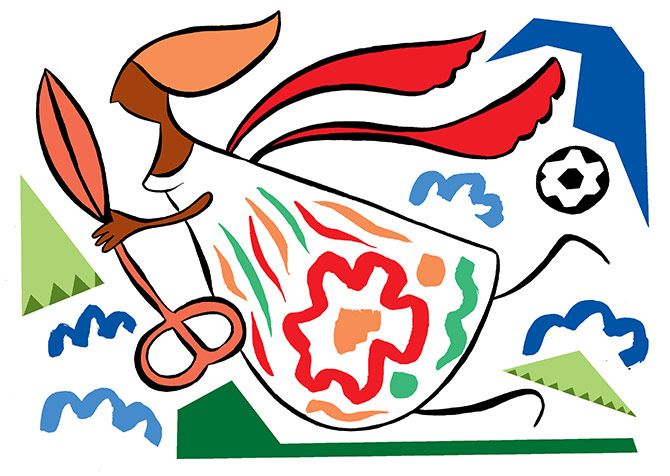Monika explains that girls like her living in villages have no access to fashion.
Access to "nice clothes" and the freedom to wear them, she tells Geetanjali Krishna, could go a long way in developing the confidence of young girls like herself.
Illustration: Uttam Ghosh/Rediff.com

She's a slip of a girl, studying for her Class 10 board examinations.
From a small village in Bihar, she now lives in Ranchi and bemoans the lack of exposure that small-town girls like her have.
Of course, Monika Kumari, the 16-year-old football coach at Yuwa, the Jharkhand-based NGO that is using football to empower and educate young rural girls, shouldn't really be complaining about lack of exposure. She's returning from her second trip to Spain.
"The first time I went there to participate in a tournament," she smiles. "This time, I was sent there to learn how to coach better."
Coming from a society where girls usually become mothers around her age, this young coach's story not only fascinates me, but it also, quite unexpectedly, teaches me a thing or two.
The first lesson I learn is about the power of persistence.
When a young Monika watched her brother go out to play and her mother chided her gently for also wanting to go, the little girl kept asking for permission to play till her parents gave in.
"At the time, I was in a government school where, instead of teaching us, the teachers made us press their feet," she recounts.
She didn't lose heart and somehow managed to get into the Yuwa school where she gained access to football -- and high quality teaching.
Yuwa appointed Monika and a couple of other girls to coach younger players.
"I feel happy that they are being able to play football at a younger age than I did," she says. "They'll benefit much more from the experience."
Listening to her, it's clear that she sees herself not simply as a beneficiary of a development initiative, but as an active agent in it.
Lasting social change, I realise, can best be effected when the boundaries between the change-makers and beneficiaries are blurred.
Monika's story also drives home the fallacy of the belief that people's attitudes are absolute.
"Earlier, my father had very traditional views about women in sports," Monika recounts. Today, however, he proudly distributes sweets every time she wins a game or is selected for a big tournament.
"My own life has shown me that people can change," she says. "Now, we talk to parents who want to get their daughters who are our age, married. I feel confident we can change at least some of their attitudes."
When I ask about her plans, at first her reply seems standard. "I want to do something to help young girls like myself to come out of the villages and see the world," she says.
I assume that by this she means that she would like to work in Yuwa and transform the lives of many more girls -- but I'm wrong.
"I want to become a fashion designer," she says, to my surprise.
Monika explains that girls like her living in villages have no access to fashion.
In her experience, she says, access to "nice clothes" and the freedom to wear them could really go a long way in developing the confidence of young girls like herself.
"Being one of them, I'll understand better what sort of clothes they'd like to wear," she says, "and will also try to change how people look at us and judge us by our clothes."
Long after our conversation, I find myself thinking about Monika's dream of empowering young girls with nice clothes.
No social scientist would have ever thought of this, but clearly, it underlines the need for the development sector to listen harder to the voices of their intended beneficiaries.
Monika, I realise, may simply coach football back home but she has certainly taught me some valuable lessons.











 © 2025
© 2025